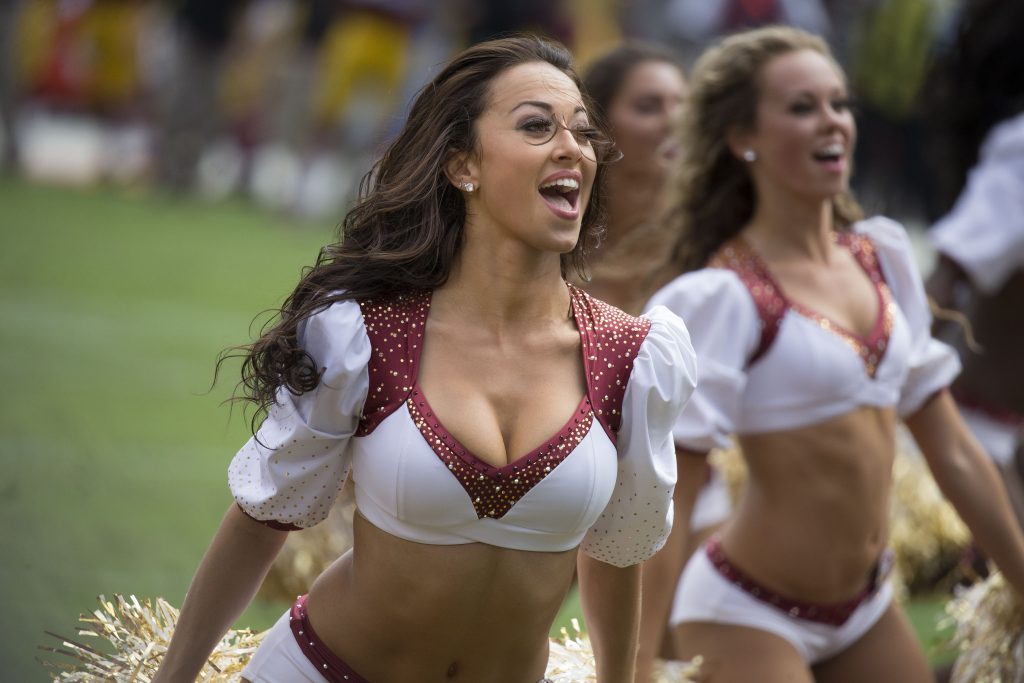
Photo Credit: Keith Allison, Creative Commons 2.0
During the past few months, a number of NFL cheerleaders have come forward, after allegedly experiencing discriminatory and unfair treatment.
In March, former New Orleans Saints cheerleader, Baily Davis, filed a complaint with the Equal Employment Opportunity Commission, claiming that her employer enforced a double standard when they reprimanded her for posting a photo on her Instagram account. In the photo, the twenty-something Davis wore a one piece, which Saints officials said violated rules prohibiting cheerleaders from posing in the nude or in scanty clothing. No such rule exists for NFL players, all of which are male.
Davis’ complaint is just one among a series of complaints voiced by NFL cheerleaders. Most recently, at the beginning of May, a New York Times report exposed a hostile environment that Washington Redskins cheerleaders have been forced to endure.
Hostile Environment
According to the exposé, cheerleaders were forced to pose topless for a photo shoot in Costa Rica in 2013, and to make matters worse, male sponsors were permitted to stand and watch the half-nude cheerleaders, who had no say in the matter. What’s more, the cheerleaders were forced to travel to Costa Rica, but were not compensated for time spent on the island. Instead, the Redskins covered travel expenses, food and lodgings, while dancers were forced to work a 14-hour day.
After a full day of photo shoots and dance rehearsals, nine women were told they had to attend an event as escorts for team sponsors.
“[G]et back to your room and get ready,” the cheerleading director told the nine women, who were forced to tears after a long unpaid work day. One cheerleader spoke with the Times, saying, “They weren’t putting a gun to our heads, but it was mandatory for us to go.” She continued, “We weren’t asked, we were told. Other girls were devastated because we knew exactly what she was doing.”
Before It’s Too Late
Though the cheerleaders were clear that the night-out did not involve sex, they noted that they were essentially “pimped out” as “sex symbols.” “It’s just not right to send cheerleaders out with strange men when some of the girls clearly don’t want to go,” said one of five cheerleaders, who came forward but requested anonymity because of a confidentiality agreement they signed. “But unfortunately, I feel like it won’t change until something terrible happens, like a girl is assaulted in some way, or raped. I think teams will start paying attention to this only when it’s too late,” she continued.
Legal Action
The New York Times report comes as a preemptive strike, meant to prevent the horrific possibility of sexual assault. Others have opted to pursue legal action. Bailey Davis is one. Another, named Kristan Ware, who used to cheerlead for the Miami Dolphins, has filed a complaint, alleging that her former team discriminated against her on the basis of religion and gender.
According to Ware, players may express their religious inclinations out in the open – online, on the field, wherever they please – but Ware has had to endure unfair backlash for certain expressions of religious devotion. Before beginning her third and final season in 2017, the cheerleader decided to get baptized, and as many others have done, she chose to post a photo of the event on social media.
Not long after, Ware noticed that the cheerleading director, Dorie Grogan, (along with several other officials), began to treat her differently. And after officials discovered she was a virgin, waiting for marriage, they began to chastise her and even on one occasion made her wear an angel outfit for a photo shoot. According to Ware, when she decided to leave the runway, Grogan grabbed her, verbally abusing her as the cheerleader exited stage.
Different Channels
Ware went through the proper channels, filing a complaint with human resources, but nothing happened. Things continued as they had. More recently, she filed a complaint with the Florida Commission on Human Relations.
Davis, for her part, is hoping to make headway with the EEOC. Her claim targets the very heart of the NFL’s egregiously imbalanced view of gender. According to her claim (and the Saint’s handbook), cheerleaders aren’t permitted to approach players – this is known as the anti-fraternization policy – but players face no negative consequences for such behavior. This means that a cheerleader must leave a restaurant if she notices that a player was there first.
Sara Blackwell, Davis’ lawyer, put it this way: “If the cheerleaders can’t contact the players, then the players shouldn’t be able to contact the cheerleaders.” She continued, “The antiquated stereotype of women needing to hide for their own protection is not permitted in America and certainly not in the workplace.”
Davis was fired shortly after she posted a photo of herself on Instagram. But she continues to fight for other cheerleaders: “I’m doing this for them so they can do what they love and feel protected and empowered and be a female athlete and not be pushed to the side and feeling unimportant.”
Saints’ cheerleaders who are in their fourth year make only $3 above the minimum wage. That’s $10.25 per hour. Perhaps looking ahead, advocates can begin to fight for better pay as well.



Leave a Comment